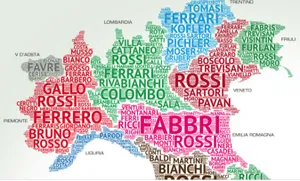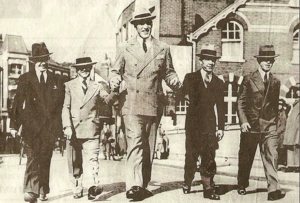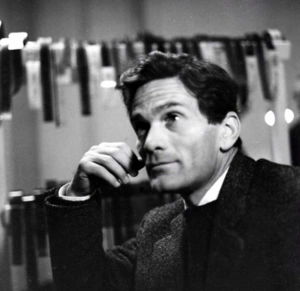
Friulan surnames are those found in the region of Friuli-Venezia Giulia in Italy, as well as in some parts of the rest of the country as well as the Italian diaspora.
History of Friulan surnamesHistory of Friulan surnames
In Italy, the formation of surnames occurred over a period of time between the year 1000 and the beginning of the 14th century, but it is likely that some isolated areas delayed considerably. Friuli, for the most part, falls within these "delayed" areas, and the formation of surnames occurred in "random order."[1]
Surnames of Friulan origin, however- have not been very widespread over time. The reasons are probably to be found (without considering the small size of the region) in the important migratory phenomena that have characterized the territory.[2]
Friulan naming conventionsFriulan naming conventions
Friulan surnames can be generally recognized bv the suffixes "-ussi", "-utti", "-ut", "-az", "-oz", which are distinctively different from other Italian surnames, as well as because many surnames end in "is", in consonants "l", "n", "r", and "z" (such as Canal, Manin, Furlan, Schiavon, and Venier). The Prefix "Di" is also common in Friulan surnames as well as in other parts of Italy like Abruzzo-Molise, Veneto and Sicily.[3][4]
Friulan surnames can be:
- Onomastic (coming from a proper name)
- Toponymic, originated from a place of origin
- Descriptive, derived from a person's physical or behavioral characteristic
- Derived from an occupational origin
- Derived from object names (Campana, Corda, Piva)
- Slovenian and German origin
Friulan surnames of onomastic originFriulan surnames of onomastic origin
- Mauro (also defines the skin color “moro”)
- Zuliani
- Beltrame
- Venier
- Marcuzzi
- Martin
- Venturini
- Colussi
- Bortolini and Bortolussi
- Colautti
- Zanin
- Santin
- Mattiussi ecc [5]
- Toniutti (from Antoni, Antonio)
- Zorzetti (from Zorç, Giorgio)
- Colautti (from Nicolau, Nicola)
- Blasoni (from Blâs, Biagio)[2]
Many Friulan surnames them derive from local saints, like Ermacora (with Macor, Macorigh, Macoratti) and Canziano (with Cancian, Canciani, Coceancig, Coceani, Coceano, Cocianni). [1]
Friulan surnames of toponymic originFriulan surnames of toponymic origin
Some well-known Friulan surnames associated with a location are Bressan (from Brescia) and Visintin, local form for Visentin; also common toponymic surnames are Trevisan (from Treviso) Cargnelutti (from Carnia), Pavan (from Padova) and Furlan, a variety of the toponym Friulan.[2]
Many Friulan surnames also derive from places in a town, like D’Agaro, Bearzot, Braida, Brollo, Brussa, Fontana, Fontanini (fountain), Piazza and Plazzotta (square), Zucchi, Zucco.[1]
Friulan surnames of descriptive originFriulan surnames of descriptive origin
Some Friulan surnames can be derived from a person's physical or behavioral characteristics, like Rossi and Rosso (red), Moro (dark), Basso and Bassi (short), Rizzi (curls), Corazza (shell), Degrassi (from fat), and Bevilacqua, which means the one who drinks water. [2]
Other less common surnames of descriptive origin coming from the region of Friulia-Venezia Giulia are Moretti, Bianchi (white), Negro (black) for hair color or complexion; Bassi and Basso (short), Dal Piccolo (from small), Longo (long), for stature; Grassi (fat), Magri (skinny) for physical features; Ciotti, Del Zotto (lame), Cromaz, Gobitti and Del Gobbo (hump), Sguerzi, for physical defects.[1]
Friulan surnames of occupational originFriulan surnames of occupational origin
Some Friulan surnames associated with an occupation or type of work are:
- Fabbri with Fabris and Del Fabbro as variants of blacksmith
- Degano (dean)
- Calligaris (from cjaliâr, calzolaio – shoemaker)
- Fantin(jockey)
- Salvador (savior)
- Moras
- Tomat
- Marson
- Zanier
- Zambon
- Piccinin
- Turchet
- Pitton
- Cossar (from cossâr, basket maker)
- Marangoni (from marangon, carpenter)
- Del Ben and Bon. [5]
Some rare Friulan surnames derive from disappeared occupations, like Pividori (bagpipes player), Cimador (clothes topping) and Stringaro (strings producer) [1] [2]
Friulan surnames derived from object namesFriulan surnames derived from object names
Friulan surnames of foreign originFriulan surnames of foreign origin
The region of Friulia-Venezia Giulia limits with Austria and Slovenia, and there are a few Friulan surnames that were brought by Austrian and Slovene migrants into the region or have been influenced by the German and Slovene languages, like Blasutig, from the Friulan name Blasùt (diminutive of Blâs, that is the proper name Biagio) with the slovene ending -ig.[5]
The most common Friulan surnamesThe most common Friulan surnames
Famous people with Friulan surnamesFamous people with Friulan surnames
Primo CarneraPrimo Carnera

Primo Carnera - the greatest Italian boxer of the 20th century; born on October 25, 1906, and is known, even today, in Italy and around the world, as the "giant who first took the Italian tricolor around the world through the noble art of boxing. He was the first Italian boxer to win the world heavyweight title. Called the Giant[6] not only for his sporting feats, but because of his stature and mighty physique: more than 2m tall and weighing around 120 kilograms.
Pier Paolo PasoliniPier Paolo Pasolini

Pier Paolo Pasolini (5 March 1922 – 2 November 1975) was an Italian poet, film director, writer, screenwriter, actor and playwright. He is considered one of the defining public intellectuals in 20th-century Italian history, influential both as an artist and a political figure. He is known for directing the movies from Trilogy of Life (The Decameron, The Canterbury Tales and Arabian Nights).
Carlo RubbiaCarlo Rubbia
Carlo Rubbia is a physicist and academic from Gorizia, Italy. He won the Nobel Prize in physics in 1984.
Italo SvevoItalo Svevo
Italo Svevo, alias Aron Hector Schmitz,[6] born in Trieste in 1861, was a writer and a playwright . Among his works the most famous is "La coscienza di Zeno nel 1923."
Gae AulentiGae Aulenti
Gaetana (Gae) Emiliana Aulenti was an architect born in Palazzolo dello Stella. She is known for the design of the Musée d'Orsay in Paris, the Italian Cultural Institute in Tokyo, and the square dedicated to her located in the city of Milan.
Lelio LuttazziLelio Luttazzi
Lelio Luttazzi was a pianist, conductor, actor and singer. He is best known for acting in a number of Italian films and for hosting Musical Variety together with Teddy Reno.
Gino PaoliGino Paoli
Singer and songwriter Gino Paoli is famous for the song "Il cielo in una stanza."
Renato BalestraRenato Balestra
Designer Renato Balestra is recognized for his talent and his haute couture collections.
Umberto SabaUmberto Saba
Italian writer and poet Umberto Poli, known as Umberto Saba, was an exponent of the literary current of the twentieth century.
See moreSee more
Explore more about Friulan surnamesExplore more about Friulan surnames
- MyHeritage DNA at MyHeritage
- Ethnicities around the world at MyHeritage
- What Is My Ethnicity? How MyHeritage Estimates Ethnicities at MyHeritage Knowledge Base
- Where's My Ethnicity?!: Why An Ethnicity Might Not Show Up In Your DNA (and How To Find Evidence Of It Anyway) at MyHeritage Knowledge Base
References
- ↑ 1.0 1.1 1.2 1.3 1.4 1.5 “I cognomi del Friuli” Enos Costantini e Giovanni Fantini.
- ↑ 2.0 2.1 2.2 2.3 2.4 https://www.diariodelweb.com/udine/articolo/?nid=20170902_444367
- ↑ Surnames in Friuli-Venezia Giulia, Italy
- ↑ The Meaning and Origins of Italian Last Names. ThoughtCo.
- ↑ 5.0 5.1 5.2 https://www.treccani.com/
- ↑ 6.0 6.1 https://www.ilcomuneinforma.com/viaggi/7544/personaggi-del-friuli-venezia-giulia-nazario-sauro/

